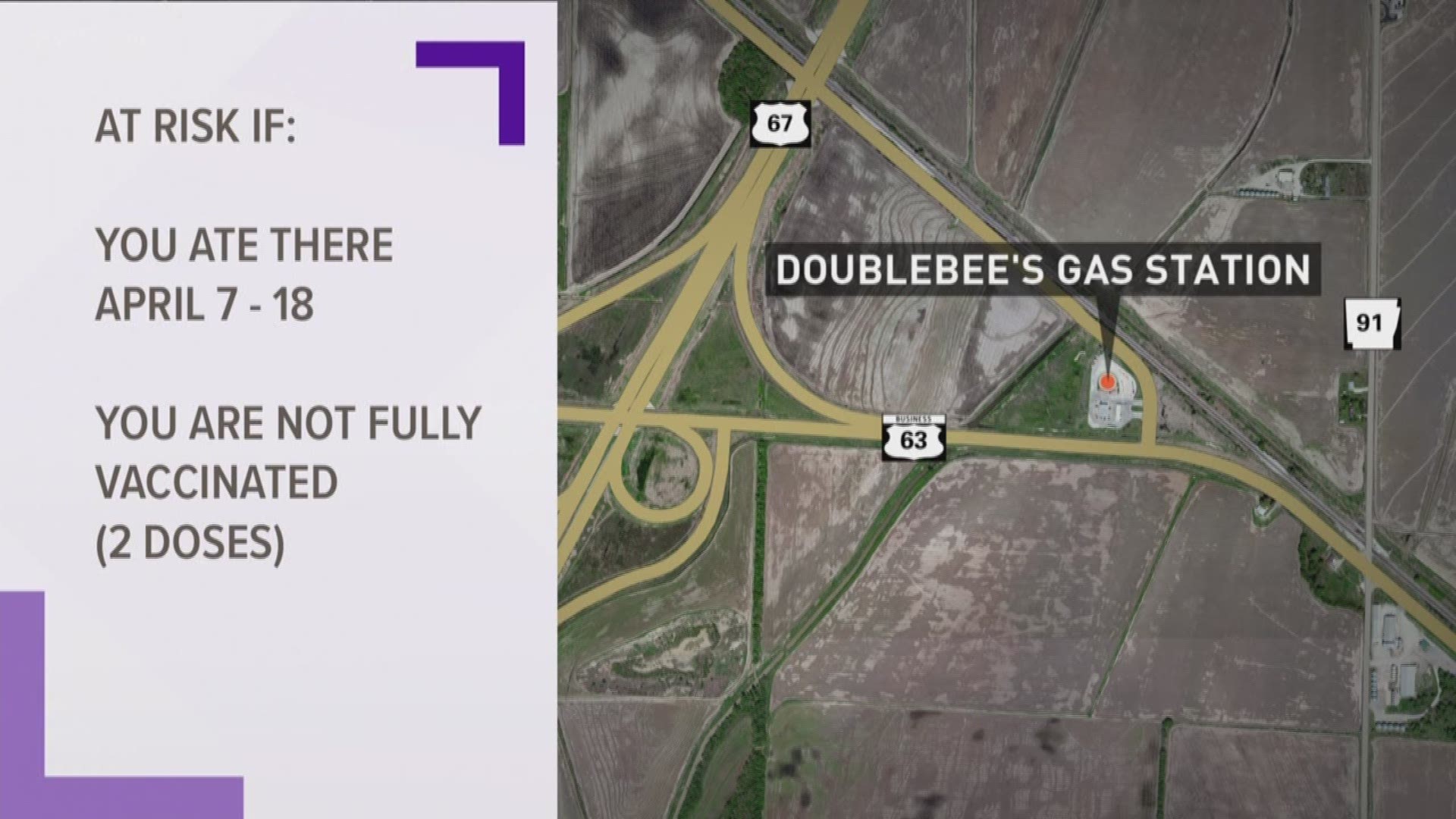LITTLE ROCK, Ark. (KTHV) - The Arkansas Department of Health (ADH) is warning of a possible Hepatitis A (Hep A) exposure after an employee of the Doublebee’s gas station in Walnut Ridge, Ark., located at 1003 Hwy 63, tested positive for the virus. Hep A is a contagious liver disease.
Anyone who ate at this facility between April 7 and April 18, 2018 should seek care immediately if they have never been vaccinated against Hep A or are unsure of their vaccination status.
There are no specific treatments once a person gets Hep A; however, illness can be prevented even after exposure by getting the vaccine or a medicine called immune globulin. This medicine contains antibodies to Hep A and works best if given within two weeks of exposure to the virus.
RELATED HEADLINES: Possible Hepatitis A exposure to Flash Market/Subway customers in Corning
The Lawrence County Local Health Unit (LHU) in Walnut Ridge will hold a walk-in clinic to provide vaccinations from 8 a.m. to 4:30 p.m. Wednesday, April 25. The Lawrence Co. LHU is located at 1050 W Free St. in Walnut Ridge. Those people who cannot attend the clinic will need a vaccine or medicine in the next week in order to prevent illness. Anyone who ate at this location and does not live in the area should contact their LHU or their healthcare provider.
People without symptoms who have eaten at this Doublebee’s between April 7 and April 18, 2018 and are:
- Under one year of age are too young to be vaccinated so caregivers should call their health care provider for medicine.
- One year of age and older and have never been vaccinated for Hep A should get the vaccine. They can come to the LHU during the hours posted above, or contact their healthcare provider to get the vaccine. Those who are pregnant, have chronic illness or liver disease are especially encouraged to consult with their doctor for immune globulin (medicine).
So far this year, 13 cases of Hep A have been reported in this outbreak. Five of the cases have involved food service workers. All 13 of the current cases have been in adults
“The number of cases in this Hep A outbreak are continuing to rise,” said Dr. Dirk Haselow, State Epidemiologist. “There are numerous Hep A outbreaks occurring across the country. We are encouraging everyone in the county and surrounding areas to be aware of the risk factors for getting Hep A.”
Hep A is usually spread when a person ingests tiny amounts of fecal matter from contact with objects, food or drinks contaminated by the feces, or stool, of an infected person. Hep A can also be spread through unprotected sex or sharing of injection drugs.
Typical symptoms of Hep A include fever, fatigue, loss of appetite, nausea, vomiting, abdominal pain, dark urine, clay-colored bowel movements, joint pain, or jaundice (yellowing of the skin or eyes). Hep A is a contagious liver disease that results from infection with the Hepatitis A virus. It can range in severity from a mild illness lasting a few weeks to a severe illness lasting several months. A person can transmit the virus to others up to two weeks before and one week after symptoms appear.
The virus can cause illness anytime from two to seven weeks after exposure. If infected, most people will develop symptoms three to four weeks after exposure. Many people, especially children, may have no symptoms. The older a person is when they get Hep A, typically the more severe symptoms they have. Up to one in three adults are typically hospitalized. Almost all people who get Hep A recover completely and do not have any lasting liver damage, although they may feel sick for months.
Hepatitis A is preventable through vaccination. Hepatitis A vaccine has been recommended for school children for many years, and one dose of Hep A vaccine is required for entry into kindergarten and first grade as of 2014. Most adults are likely not vaccinated, but may have been if they received vaccinations prior to traveling internationally. Please contact the LHU in your county for more information about vaccination. A listing of LHUs can be found at www.healthy.arkansas.gov.

